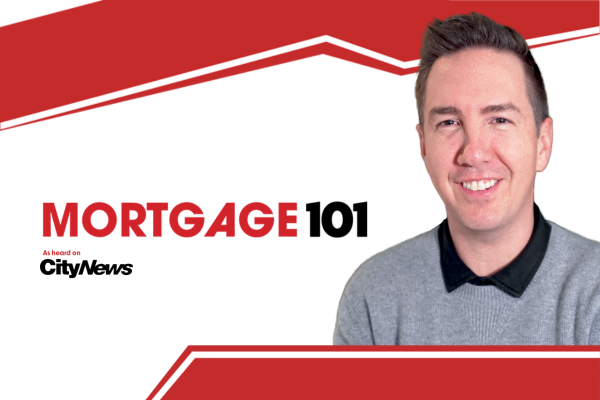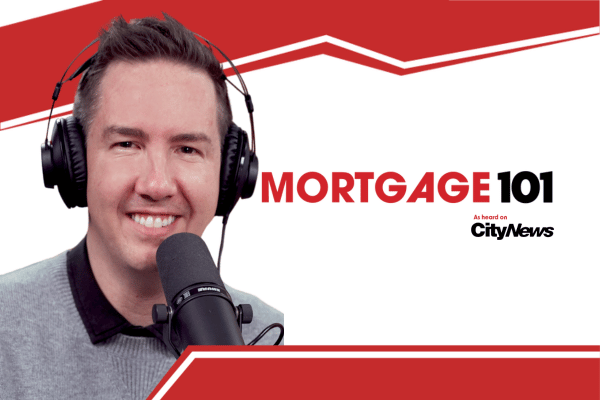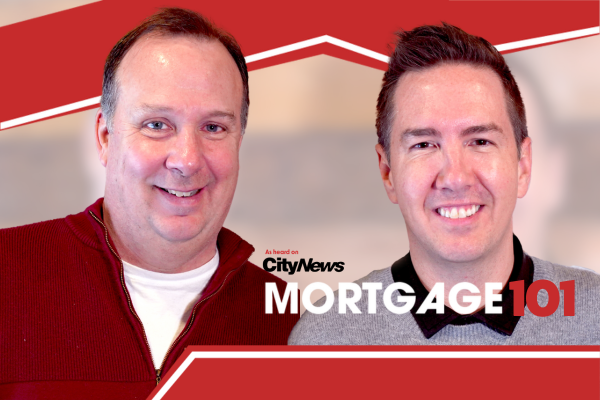Clinton and Todd explore the evolving landscape of homeownership, offering insights and expertise! Join us this episode of Mortgage 101, as we dive into discussions ranging from Halifax's growing reputation, to the nuances of mortgage lending.
Mortgage 101 – There’s so much going on in mortgage lending right now | July 2022 Part 3
In this episode of Mortgage 101 with Clinton Wilkins and Todd Veinotte, as heard on CityNews 95.7 and CityNews 101.1, the guys talk about how much is going on in mortgage lending right now with interest rates and inflation. Hear discussions on when interest rates will go back down and possible changes to the current stress test.
Mortgage 101 with Clinton Wilkins & Todd Veinotte: There’s so much going on in mortgage lending right now
Don’t feel like watching the video? Check out the transcript below.
Transcript:
There’s so much going on in mortgage lending right now
Todd Veinotte: [00:00:00:02] So for those who might not know all about Mr. Clinton Wilkins and what you do. Just a quick overview, we have new listeners all the time.
Clinton Wilkins: [00:00:07:01] I’m Clinton Wilkins. I’m a mortgage broker in Halifax, and I’ve been in the industry for it seems like forever. I think going on 18 years. We’ve funded almost 5000 transactions for over $1 billion. And I always think that I’ve seen everything, but every day, I see something new with mortgage lending.
And you know what? There’s so much going on in mortgage lending in real estate right now, which I think is really cool. I don’t think there’s ever been a time where people have been so interested on what’s going on in the industry that I work in. Let me tell you, at parties, I’m very popular.
Todd Veinotte: [00:00:40:22] Well, you always were, but now you’re extra popular. So is this, would you describe the times that we’re in, I don’t want to use an adjective that that’s over the top. But is it tumultuous times in some ways? Depending on the on the lender in the situation, it can be, I suppose.
Clinton Wilkins: [00:00:58:05] Yeah, I think it’s a challenging time for a lot of borrowers, Todd. I think for existing homeowners it certainly is challenging. You know, there’s certainly a pinch when it comes to interest rates.
As you know, there’s been an increase in fixed rates over the last several months, but obviously the Bank of Canada has increased their key overnight rate. So anybody who’s in a variable rate mortgage, obviously is paying a little bit more right now.
Todd Veinotte: [00:01:20:03] Yeah.
Clinton Wilkins: [00:01:21:06] And you know, they’re probably going to pay a little bit more for the next 12 to 18 months. And some economists think that we’re going to be in a recession type territory by the end of next year. So that may have an impact on the rates. And I think we’re likely going to see some softening if we do get into a recession.
Todd Veinotte: [00:01:37:24] Some softening of rates.
Clinton Wilkins: [00:01:39:18] Yeah.
When will interest rates start to go back down?
Todd Veinotte: [00:01:39:19] Right. Any idea what you think that that benchmark might go to? I know that it’s hard to predict something like that, but.
Clinton Wilkins: [00:01:45:17] Well, some of the economists were saying that the like the key overnight rate might get to three, three and one half percent. That’s where they think it’s going to kind of level out at. And that’s going to make the prime rate, you know, in the five percent range for a variable rate customer. That may be a little bit concerning, Todd.
You know, most borrowers that are in a variable rate are prime minus 50, prime minus 100, depending on, you know, the discount that you have below prime. In comparison, the same type of products today in a fixed rate are in the low to mid five percent range.
So there’s still quite a spread between where a borrower is today at a variable and where the fixed is. And some borrowers are asking me about converting their variable rate products into a fixed. You know, some are asking me.
Todd Veinotte: [00:02:33:29] And justifiably so.
Clinton Wilkins: [00:02:35:08] I think you know, I think people are certainly concerned. Some customers feel like they’re paying 30 percent more already. The one thing that we need to remember and you know, we’re still at pre-pandemic prime rates. So that’s one thing I just want to throw out there. The prime rate is still lower than it was before the pandemic started.
Obviously, we’ve seen some increases and there was a news article the other day, we were just talking about it before we started recording our show. You know, in the article it said The Bank of Canada has got it right zero percent of the time trying to slow inflation. And they basically caused recession every time that they’ve increased interest rates. So it was a really interesting article.
Todd Veinotte: [00:03:21:08] Sometimes that’s inevitable, though, is it not? You have to at some point.
Clinton Wilkins: [00:03:26:22] They need to slow the train.
We’re not going to see interest rates like they were in the 80s
Todd Veinotte: [00:03:27:25] Yeah, that’s right. I mean, we look back in, a lot of people compare different eras and of course the seventies when they had grinding inflation and interest rates were in the upwards to the 20 percent range.
Clinton Wilkins: [00:03:41:22] In the eighties.
Todd Veinotte: [00:03:42:14] The eighties. Right. That’s not happening from everything we can gather. That would be impossible. That would cripple everything right now, would it not?
Clinton Wilkins: [00:03:48:25] It would definitely have a very negative impact on borrowers. Consumer debt is at an all time high and people owe a lot more now, Todd, than they did back then. Yeah, no one had $500,000 mortgages back then. That was very unheard of.
People’s mortgages were much smaller and even the amount that they were using for their housing cost, Todd, was a lot lower back then than it is now. So certainly the government is very, you know.
Todd Veinotte: [00:04:16:16] So you’re comparing that per income. Per portion of your income? Apples and apples?
Clinton Wilkins: [00:04:22:26] Apples and apples. So the percentage that was going out of the household was less then than it is now. Right. The cost of housing as a percentage is higher today than it was then and the incomes haven’t caught up, Todd. That’s what I think is interesting. So we’ve obviously seen a lot of inflation.
Inflation and the stress test
You know, everyone’s kind of throwing out this 30 percent number. You know, groceries are 30 percent more expensive and fuel in some cases is even maybe more than 30 percent more expensive than it was before. And that’s having an impact. It’s not just the cost of borrowing that is challenging for a household. You know, there are certainly a lot of other things like consumer goods that are really negatively impacting kind of.
Todd Veinotte: [00:05:03:11] Here’s a question for you. I know throwing a lot at you here, but the stress test and we know what the stress is, but quickly for those who don’t know what the stress test is. And then I want to ask you the stress test question.
Clinton Wilkins: [00:05:11:05] Yeah. So the stress test is a qualifying test that we do for every single mortgage. So you have to qualify on a rate and it’s a posted rate currently at 5.25 or 2 percent above your contract. So if you’re getting a fixed rate product today, let’s say your fixed rate is 5 percent, you have to qualify at 7 percent.
So obviously that is really challenging for a lot of borrowers. So today, it’s actually easier to qualify for a variable rate mortgage than it is a fixed rate. And more than 50 percent of consumers right now are taking a variable, even with knowing the Bank of Canada is going to increase the overnight rate. So Canadians are still getting a variable rate mortgage every day.
Todd Veinotte: [00:05:50:23] Okay. So the question is, the stress test was embedded and designed to protect borrowers, obviously, right? And then inherently the lender as well. However, there’s a stress test, but who knew about these interest rates that have gone through the roof? So is there something that could be in play to deal with potential skyrocketing inflation?
Clinton Wilkins: [00:06:12:10] Yeah. So typically they look at the stress test once a year. But that doesn’t mean, Todd, that the Department of Finance.
Todd Veinotte: [00:06:18:12] They could intervene.
Clinton Wilkins: [00:06:19:23] They could definitely change the stress test rate any time.
Todd Veinotte: [00:06:23:14] Right.
Stress test review might be on the horizon
Clinton Wilkins: [00:06:23:25] I would not be surprised if we see the stress test changing maybe a few times, depending on what happens. Because right now it is so much easier to get a mortgage in a variable rate product. Some borrowers are choosing to take that variable rate, even if it may not be the best product for them because it’s easier to qualify. And that’s what the Bank of Canada doesn’t, or not the Bank Canada, but that’s what the Department of Finance doesn’t want.
They want people to qualify and be in a situation that they know they can afford it when the mortgage comes up for renewal. Todd, you know what I’m really concerned about? What I’m concerned about the people that have these rock bottom fixed rate products and when they,
Todd Veinotte: [00:07:09:01] Renewal.
Clinton Wilkins: [00:07:09:20] When they come up for renewal and I have I have a lot of concern clients. I have more concerned clients that are in a fixed rate today. Todd, than I do on a variable. People know variable is variable. They know it’s going to go up and they think it’s likely going to come down.
We’re obviously communicating a lot with our clients. We’re putting out a lot of really good information, but the ones that are really concerned are the people that are in the fixed rates.
Changing your mortgage product from a variable to a fixed
Todd Veinotte: [00:07:32:05] So you can’t move from a fixed to a variable?
Clinton Wilkins: [00:07:34:07] You cannot without breaking it. And obviously that’s going to cause sometimes a significant penalty.
Todd Veinotte: [00:07:38:13] That’s another reason why a variable is advantageous, because you can convert.
Clinton Wilkins: [00:07:41:21] Yeah, you certainly can convert to a fixed, but you can’t go from a fixed into a variable. And certainly renewal is a big, big topic. And we’re talking to a lot of consumers that are at renewal and we’re talking to a lot of consumers that are in the middle of their term, just obviously doing a lot of planning right now and certainly a lot of talking about what the best direction is.
Todd Veinotte: [00:08:04:14] So we got lots to talk about and we could drill down on that because I got more questions on that and we’ll see what we have time for. But just what else have we got coming up? Tee this up. What do you want to talk about?
Next up is refinance
Clinton Wilkins: [00:08:12:11] So we’re going to talk to a local Halifax realtor about what’s going on here in the market. As you know, across the country, there’s been a lot of softening in the real estate market. So we’re going to get a little bit of perspective on what’s happening here later in the show. We’re also going to talk about refinance and how that might be a good time this summer.
Todd Veinotte: [00:08:30:20] I’ve got an anecdote of my own for that, by the way.
Clinton Wilkins: [00:08:32:16] Okay, good, good. And we’re going to talk about pride and homeownership. We’re hosting an event for Pride and Pride here in Halifax is starting next week. So we’re going to talk about some of the impacts for Pride and what goes on in the market.
Todd Veinotte: [00:08:45:08] All right. Mortgage 101: Your Guide to Homeownership with Clinton Wilkins and myself, Todd Veinotte. We’ll be right back.
If you have any questions, get in touch with us at Clinton Wilkins Mortgage Team! You can call us at (902) 482-2770 or contact us here.


